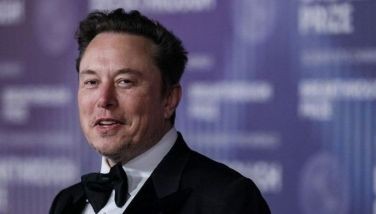Sharp goes green - and yellow, too
MANILA, Philippines - Yellow is the color of the times. Even technology lends itself to the color yellow. While we may all still think that TV sets only have room for the holy trio of RGB for red, green and blue colors, Sharp Corp. spins the color wheel to add a fourth one — yellow — for maximum color precision, they say.
At a press conference last week, Sharp officials from Japan announced their new Quattron quad pixel technology which applies a four-color system to boost the color quality and deliver advanced picture quality to the Sharp AQUOS LCD TV line.
By adding yellow to the standard three-color array of red-green-blue screen pixels, Sharp allows its LCD screens to project objects or scenes in vivid hues of yellow such as golds, corns and sunflowers. Sharp officials say this four-primary-color display faithfully renders more than a trillion hues, most of which were previously undetected by the naked eye, like the golden yellow color of brass instruments, for example.
Sharp’s Quattron LCDs also incorporates Sharp’s new UV2A photo alignment technology, which provides mega-contrast, high efficiency and high speed response. The Quattron LCDs are available in 52-, 46-, and 40-inch sizes.
More on yellow power, Sharp officials also talked in length about their company’s innovations in solar technology. In his presentation, SPC president and general manager Juntaro Shimamoto said, “Unknown to many, Sharp is a world leading solar company. In fact, we began developing solar panels in 1959, well before issues on global warming and dwindling fossil fuel supplies came out.”
The company’s strong commitment to developing this alternative power source enabled it to become the first in the world to achieve a cumulative total of two gigawatts of solar power production by the end of 2007, laying claim to having produced about one quarter of all solar power generated around the world.
Sharp’s advanced solar panels are used in navigational systems, satellites, skyscrapers, villages, and various commercial applications worldwide.
Last March, Sharp inaugurated a new thin-film type solar cell plant, with an annual production capacity of 1 GW, in Sakai City, Osaka Prefecture in Japan.
Sharp is trying to popularize solar technology in the Philippines, too, as can be seen from its efforts in starting a solar farm in Cagayan de Oro City and creating a solar-powered jeepney.
Sharp also applies its strengths and leadership in creating energy to saving energy. To be ecologically responsible, Sharp is advocating strongly the use of LED (light emitting diode) lighting which has the potential for vast energy savings. A single LED bulb lasts as long as 40,000 hours or the equivalent of around 40 ordinary bulbs.
While a typical bulb uses about 60 watts, the LED bulb consumes just 7.6 watts, which translates to energy savings of up to 80 percent, said Naotaka Ohtsuka of Sharp.
This, he said, is great news for Filipinos who endure the highest cost of per kilowatt-hour among five countries in Southeast Asia. LED lights also emit a cool ambiance because they have less infrared rays and less UV rays, and no mercury content, Ohtsuka added.
Sharp has manufactured over 2.5 million LED lamps in Japan and has ambitious plans of rolling out the technology to more urban centers around the world. The company’s Sakai factory alone already has 100,000 energy-efficient lighting fixtures, contributing to the reduction of about 17,750 tons of carbon dioxide every year.
Sharp officials also discussed how they are using ion technology to contribute to consumers’ health and wellness. Sharp’s Plasmacluster technology contributes to a cleaner indoor environment as it inactivates and removes harmful airborne elements like allergens, viruses and molds.
The technology works by releasing positive and negative ions that attach themselves to the bacteria’s surfaces to break them down. Various test facilities in Japan and around the world have validated and confirmed the effectiveness of this technology in removing such hazards as SARS, corona virus, H1N1 human influenza virus and H5N1 avian influenza virus.
To date, Sharp has sold over 30 million Plasmacluster units worldwide through its products like air purifiers, ion generators, air conditioners, refrigerators and even LED lamps.
- Latest





























